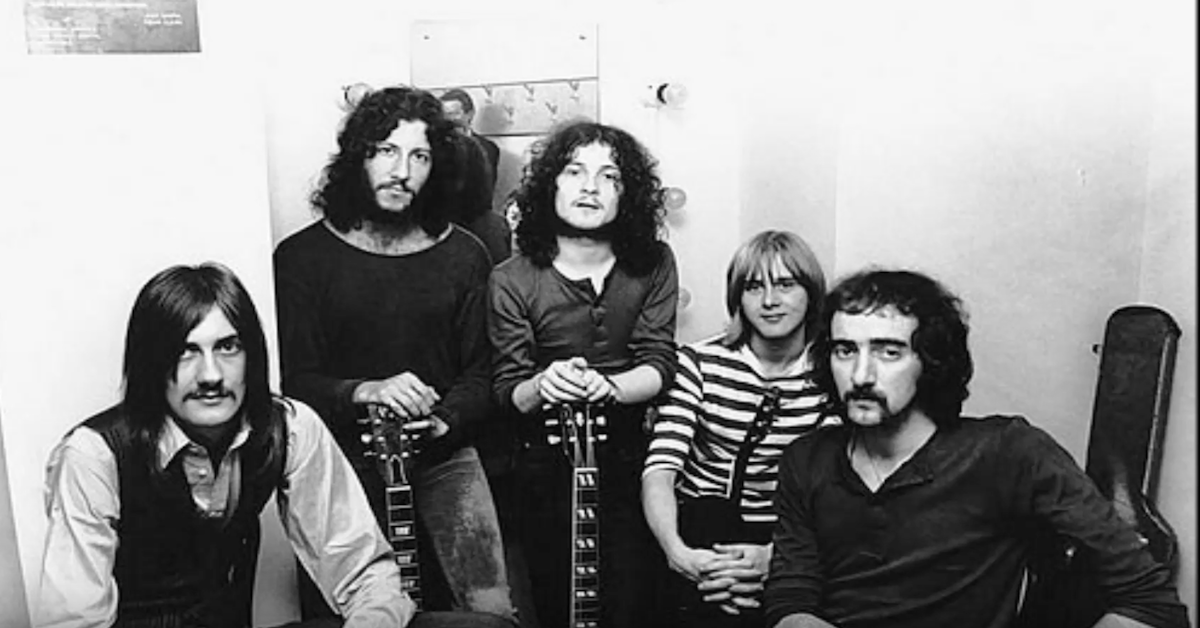July 25, 2020: Peter Green, Fleetwood Mac Co-Founder, Dies
by Best Classic Bands Staff
Early Fleetwood Mac. Peter Green is second from left
Peter Green, who co-founded Fleetwood Mac with Mick Fleetwood in 1967, died July 25, 2020. The guitarist and songwriter—he wrote such songs as “Black Magic Woman,” “Albatross” and “Oh Well”—was 73. The announcement was made by attorneys for the family, who noted that he died “peacefully in his sleep.”
In a statement on July 25, Fleetwood wrote, “No one has ever stepped into the ranks of Fleetwood Mac without a reverence for Peter Green and his talent.”
“My biggest regret is that I never got to share the stage with him,” said Stevie Nicks. “I always hoped in my heart of hearts that that would happen.”

Green was celebrated at an all-star event on Feb. 25, 2020
On Feb. 25, five months before his passing, Green was celebrated in London with an all-star event billed as “Mick Fleetwood and Friends Celebrate the Music of Peter Green and the Early Years of Fleetwood Mac.” The performance featured such acolytes as Christine McVie, David Gilmour, Pete Townshend, Billy Gibbons, former Rolling Stones bassist Bill Wyman, Steven Tyler, and others. Original Fleetwood Mac member Jeremy Spencer made a surprise appearance.
Related: Green was mourned as “one of the greatest guitarists ever”
In 1967, drummer Fleetwood, bassist John McVie and Green, all of them members of John Mayall’s Bluesbreakers, recorded a handful of songs together (one of them an instrumental titled “Fleetwood Mac,” named after the rhythm section).
A short while later, Green and Fleetwood broke away to start their own band, joined by second guitarist Jeremy Spencer and bassist Bob Brunning. The latter was replaced a few weeks later by McVie and the new group took on the wordy name Peter Green’s Fleetwood Mac featuring Jeremy Spencer.
By the time they recorded their debut album, the band’s name had been shortened to the more manageable Fleetwood Mac, which also became the title of that debut, released in early 1968. It was strictly a blues-rock affair and the new group was able to build a small but devoted following from the start due to the members’ reputations as solid players with Mayall. The album only made it to #198 in America but steadily, Fleetwood Mac gained a foothold both in their native U.K. and elsewhere.
But by 1970, there were already cracks, and they all pointed to Green. The co-founder, it seems, became rather fond of LSD, gobbling it down like M&Ms. Before long he’d grown a beard, began wearing flowing robes and spent time in a hippie commune. He suggested to Fleetwood that the band gives its money away (Fleetwood politely declined).
On April 11, 1970, Green told the band he was leaving, and no one complained all that much. He played his final gig with Fleetwood Mac on May 20.
It took years—he was diagnosed with schizophrenia and underwent shock therapy—but Green eventually emerged and found his musical footing. As of 2018 he was still performing. As for Fleetwood Mac, they too went through a few changes, but by 1975 they found a whole new way of making music.
Watch Fleetwood Mac perform “Black Magic Woman” in 1970
Green was born Oct. 29, 1946, in the East End of London. He joined Mayall’s band in 1966, essentially replacing the outgoing Eric Clapton. His first album with the band, A Hard Road, was released that year, and included his instrumental composition, “The Supernatural.”
Green was inducted into the Rock and Roll Hall of Fame in 1998 along with seven other members of Fleetwood Mac: Fleetwood, John McVie, Christine McVie, Spencer, Lindsey Buckingham, Stevie Nicks and Danny Kirwan.
Just prior to Green’s passing, Rhino announced an elaborate reissue of Fleetwood Mac’s 1969-1974 recordings, many of which feature Green.







No Comments so far
Jump into a conversationNo Comments Yet!
You can be the one to start a conversation.